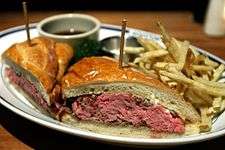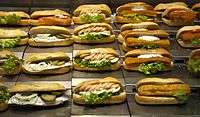Cucumber sandwich
 Cucumber sandwiches and tea | |
| Type | Sandwich |
|---|---|
| Place of origin | United Kingdom |
| Main ingredients | White bread, cucumber, butter |
.jpg)
The traditional cucumber sandwich is composed of paper-thin slices of cucumber placed between two thin slices of crustless, lightly buttered bread.
As the thinness of the bread is a point of pride in the kitchen, a dense-textured white Pullman loaf is cut with a wide-bladed knife, which guides the cut; daylight should pass through the resulting fine pores. The peel of the cucumber is either removed or scored lengthwise with a fork before the cucumber is sliced. The slices of bread are carefully buttered all the way to the edges in the thinnest coating, which is only to prevent the bread from becoming damp with cucumber juice, and the slices of cucumber, which have been dashed with salt and lemon juice, are placed in the sandwich just before serving in order to prevent the sandwich from becoming damp enough to moisten the eater's fingers. The crusts of the bread are cut away cleanly, creating tea sandwiches.
The traditional cucumber sandwich is of British origin and is made with white bread. Modern variants (largely of American origin) exist, involving cream cheese, chopped dill or spices, brown bread, salmon, and even bread with crusts left intact. One specific American variant includes benedictine, a green soft spread based on cucumbers and cream cheese.
Cucumber sandwiches are most often served for a light snack or at afternoon tea, a formal light meal served at four in the afternoon or early evening before the main supper. In addition, cucumber sandwiches can be served in the tea break at club cricket matches in England. Because of English influence on Indian culture, cucumber sandwiches are popular during cricket matches and weekend picnics. The Indian variant is flavoured with green chutney and sometimes contains slices of boiled potatoes.
Because of cucumber's cooling nature, cucumber sandwiches are often eaten in the summer months or in warmer climates, such as in parts of India. Until its demise in 2011, Indian Airlines used to serve cucumber sandwiches as part of its usual vegetarian inflight meal in short-haul domestic flights.
Cultural and historical associations
Cucumber sandwiches formed an integral part of the stereotypical afternoon tea affair. (By contrast, people of the era's lower working classes were thought to prefer a coarser but more satisfying protein-filled sandwich, in a "meat tea" that might substitute for supper.)
Some writers have attempted to draw out an association between the daintiness of the sandwich and the perceived effeteness of the British aristocracy. Cucumber sandwiches are often used as a kind of shorthand in novels and films to identify upper-class people, occasionally in a derogatory manner. In the first act of Oscar Wilde's The Importance of Being Earnest (1895), cucumber sandwiches that have expressly been ordered and prepared for Lady Bracknell's expected visit are all voraciously eaten beforehand by her nephew and host, Algernon Moncrieff; consequently he is forced to tell a little lie, with his butler's connivance: namely that "there were no cucumbers in the market this morning... not even for ready money". In addition, the sandwiches were once considered appropriate delicacies to offer to visiting clergy, in times when such visits were still a common feature of English middle class life.
In the James Bond film Moonraker, Hugo Drax asks James Bond, "may I press you to a cucumber sandwich?"[1]
The popularity of the cucumber sandwich reached its upper-class zenith in the Edwardian era, when cheap labour and plentiful coal enabled cucumbers to be produced in hotbeds under glass through most of the year. With the declining popularity of tea as a meal in the United Kingdom, there was a corresponding decline in the popularity of cucumber sandwiches, but they are still frequently served at teas, luncheons, and gatherings. Most English cricket clubs supply malt vinegar and ground pepper to dash inside the sandwich, and this is the simplest form commonly used in England.
See also
References
- ↑ "Moonraker script". Retrieved 23 May 2017.
Further reading
- Classical Southern Cooking - Damon Fowler. p. 72. Retrieved 2013-07-04.

